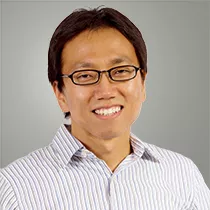
Education is very important in South Korea where Jinsub Kim grew up, but he feels his parents, and especially his mother, were perhaps even more enthusiastic than most. For Kim that meant many extracurricular activities that included sports and music. And although piano lessons didn’t spark his interest, math competitions taught him there was more to math than the arithmetic he learned in school.
“The problems were more interesting to me because they were like riddles,” Kim said.
He really liked classical geometry and was disappointed to find out that not many people studied or did research in that area anymore. He considered more than once getting a degree in mathematics but chose electrical and computer engineering for the better job prospects. In the end it turned out to be the perfect match for him.
During his required two-year military service for South Korea, Kim said he had a long time to think about what he wanted to pursue in the future. He sought out advice from his professors and discovered that the areas of signal processing, communications, and information theory fit well with his interests in mathematical analysis and theory.
“Engineering was a very good choice for me because it puts me closer to the real problems,” he said.
In graduate school and as a post-doc at Cornell University in Ithaca, New York, he focused on statistical signal processing and their applications in engineering problems. He has found applications in security and power systems and hopes to move into the area of renewable energy where there the variable nature of energy generation from sources like wind and solar create some interesting problems.

educational opportunities that could help shape their futures.
Kim finds the problems of cyber security in power systems particularly compelling because of the critical nature of preventing cyber attacks that could trigger regional blackouts.
“The importance of the problem attracted me and fits with my interest in statistical signal processing techniques applied to real world problems,” Kim said.
He is excited to be at Oregon State where he has many colleagues working on similar problems in the areas of power system, cyber security, signal processing, and machine learning.
Kim said his career path can all be traced back to the extra educational experiences that his parents sought out for him.
“I enjoyed learning math through problem solving very much and I think it’s a great way to get kids interested in a difficult subject,” he said. “The early education that I got was the driving force for me to continue pursuing a career in engineering and being happy doing it, and I want that for my children too.”
And although piano lessons did not interest him, he ended up using his musical training in college as a guitar player in a punk rock band. He valued the experience because he learned to appreciate many different kinds of music and it helped him to overcome a fear of talking in front of crowds.
Trading his electric guitar for an acoustic one, Kim later switched to playing classical guitar as part of a guitar circle and an ensemble. However these days his free time is more often spent in parks with his family.
—By Rachel Robertson